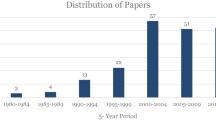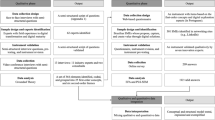Abstract
Awareness levels of individuals about various aspects of the collaborative processes can be achieved by effective promotive interactions among them. Cultural structures are regarded as one of the major determinants of knowledge sharing patterns and awareness levels of individuals in collaborative contexts. Through an exploratory review of the literature, the present study points to the two rival organisational structures of cooperation and competition that coexist in any organisation in different intensities and mixtures. Finding a desirable mix of the above two structures is currently a challenging task and no explicit method exists for determining such an ideal mix. This study provides further theoretical insights into the analysis of incompatible impacts of several factors on the awareness levels of individuals in collaborative contexts. Drawn from the findings in the current body of literature, a conceptual model is developed. The proposed model relates cooperative and competitive structures, task dimensions, and group characteristics as potential factors that determine the awareness levels of individuals. The face validity of the proposed model is checked by employing an expert focus group. As a result, a number of enhancements and improvements to the model are proposed. Pragmatic aspects of the proposed model are then discussed and recommendations for future research are provided.





Similar content being viewed by others
References
Alavi M, Kayworth TR and Leidner DE (2006) An empirical examination of the influence of organisational culture on knowledge management practices. Journal of Management Information Systems 22 (3), 191–224.
Alavi M and Leidner D (1999) Knowledge management systems: issues, challenges and benefits. Communications of the AIS 1 (2), 1–37.
Alavi M and Leidner D (2001) Review: knowledge management and knowledge management systems: conceptual foundations and research issues. MIS Quarterly 25 (1), 107–136.
Ali M and Brookes L (2008) Culture and IS: national cultural dimensions within IS discipline. In Proceedings of the Fourteenth Americas Conference on Information Systems (MONTAZEMI B Ed), pp 1–11. Curran Associates Inc., Toronto, Canada.
Alper S, Tjosvold D and Law KS (2000) Conflict management, efficacy, and performance in organisational teams. Personnel Psychology 53 (3), 625–642.
Badovick GJ and Beatty SE (1987) Shared organisational values: measurement and impact upon strategic marketing implementation. Journal of the Academy of Marketing Science 15 (1), 19–26.
Balthazard PA and Cooke RA (2004) Organisational culture and knowledge management success: assessing the behavior-performance continuum. In Proceedings of the 37th Annual Hawaii International Conference on System Science (SPRAGUE R Ed), pp 511–533, IEE Computer Society, Waikoloa, Hawaii.
Beersma B, Hollenbeck JR, Humphery SE, Moon H, Conlon DE and Ilgen DR (2003) Cooperation, competition, and team performance: toward a contingency approach. Academy of Management Journal 46 (5), 572–590.
Berson Y, Nemanich LA, Waldman DA, Galvin BA and Keller RT (2006) Leadership and organisational learning: a multiple levels perspective. The Leadership Quarterly 17 (6), 577–594.
Bock GW, Zmund RW, Kim YG, and Lee JN (2005) Behavioral intention formation in knowledge sharing: Examining the roles of extrinsic motivators, social-psychological forces and organizational climate. MIS Quarterly 29 (1), 1–26.
Bogenrieder I (2006) Co-operation in a system of distributed cognition or how to co-operate with diverse knowledge. In The Future of Knowledge Management (RENZI B, MATZLER K and HINTERHUBER H, Eds), pp 205–218, Palgrave, London.
Brandenburger A and Nalebuff B (1998) Co-Opetition. Bantam Dell Pub Group, New York.
Campbell DJ (1988) Task complexity: a review and analysis. Academy of Management Review 13 (1), 40–52.
Chen G, Liu C and Tjosvold D (2005) Conflict management for effective top management teams and innovation in China. Journal of Management Studies 42 (2), 277–300.
Chow CW, Deng FJ and Ho JL (2000) The openness of knowledge sharing within organisations: a comparative study of the United States and the People's Republic of China. Journal of Management Accounting Research 12 (1), 65–95.
Clark T, Jones M and Armstrong C (2005) The dynamic structure of management support systems: theory development, research focus, and direction. MIS Quarterly 31 (3), 579–615.
Damian DE and Zowghi D (2003) An insight into the interplay between culture, conflict and distance in globally distributed requirements negotiations. In Proceedings of the 36th Hawaii International Conference on System Sciences (SPRAGUE R Ed), pp 1–10, IEE Computer Society, Hawaii.
Daneshgar F (2004) Awareness net: a modeling language for collaborative business processes. Journal of Conceptual Modelling 32, http://www.inconcept.com/JCM/xxindex.html.
Daneshgar F and Wang W (2007) Validation of the awareness net model for the Australian security investment processes. Knowledge-based Systems 20 (8), 736–744.
Davenport TH, Long DD and Beers MC (1998) Successful knowledge management projects. Sloan Management Review 39 (2), 43–57.
Davenport TH and Prusak L (1998) Working Knowledge: How Organisations Manage What They Know. Harvard Business School Press, Boston.
DeLong DW and Fahey L (2000) Diagnosing cultural barriers to knowledge management. Academy of Management Executive 14 (4), 113–127.
Deutsch M (1973) The Resolution of Conflict. Yale University Press, New Haven.
Deutsch M (2000) Cooperation and competition. In The Handbook of Conflict Resolution: Theory and Practice (Deutsch M, Coleman PT and Marcus EC, Eds), pp 21–40, Jossey Bass, San Francisco.
Drucker PF (2005) Managing oneself. Harvard Business Review 77 (2), 64–74.
Elliott D, Helsen WF and Chua R (2001) A century later: Woodworth's (1899) two-component model of goal directed aiming. Psychological Bulletin 127 (3), 342–357.
Gold AH, Malhotra A and Segars AH (2001) Knowledge management: an organisational capabilities perspective. Journal of Management Information Systems 18 (1), 185–214.
Hatch MJ (1993) The dynamics of organisational culture. Academy of Management Review 18 (4), 657–693.
Hendriks P (1999) Why share knowledge? The influence of ICT on the motivation for knowledge sharing. Knowledge and Process Management 6 (2), 91–100.
Huang JC and Newell S (2003) Knowledge integration processes and dynamics within the context of cross-functional projects. International Journal of Project Management 21 (3), 167–176.
Janz BD and Prasarnphanich P (2003) Understanding the antecedents of effective knowledge management: the importance of a knowledge-centered culture. Decision Sciences 34 (2), 351–384.
Jarvenpaa SL and Staples DS (2001) Exploring perceptions of organisational ownership of information and expertise. Journal of Management Information Systems 18 (1), 151–183.
Jashapara A (2003) Cognition, culture and competition: an empirical test of the learning organisation. The Learning Organisation 10 (1), 31–50.
Jehn KA and Mannix E (2001) The dynamic nature of conflict: a longitudinal study of intragroup conflict and group performance. Academy of Management Journal 44 (2), 238–251.
Johnson DW and Johnson RT (2006) New developments in social interdependence theory. Genetic, Social, and General Psychology Monographs 131 (4), 285–358.
Leidner DE and Kayworth T (2006) Review: a review of culture in information system research: toward a theory of information technology culture conflict. MIS Quarterly 30 (2), 357–399.
Lencioni PM (2002) Make your values mean something. Harvard Business Review 80 (7), 113–120.
Lin WB (2008) The effect of knowledge sharing model. Expert Systems with Applications 34 (2), 1508–1521.
McDermott CM and Stock GN (1999) Organisational culture and advanced manufacturing technology implementation. Organisational Culture and Advanced Manufacturing Technology 17 (5), 521–533.
Miller P and Yu HC (2003) Organisational values and generational values: a cross cultural study. Australasian Journal of Business and Social Enquiry 1 (3), 138–153.
Mintzberg H (1991) The effective organisation: forces and forms. Sloan Management Review 32 (2), 54–67.
Nadler D and Tushman M (1988) Strategic Organisation Design: Concepts, Tools & Processes. Scott Foresman, New York.
Nonaka I and Takeuchi H (1995) The Knowledge Creating Company. Oxford University Press, New York.
Padma P, Ganesh L and Rajendran C (2008) An exploratory study of the impact of the capability maturity model on the organisational performance of Indian software firms. Quality Management Journal 15 (2), 20–34.
Phan PH (2000) Knowledge creation in strategic alliances: another look at organisational learning. Asia Pacific Journal of Management 17 (2), 201–222.
Posner BZ, Kouzes JM and Schmidt WH (1985) Shared values make a difference: an empirical test of corporate culture. Human Resource Management 24 (3), 293–309.
Ray P, Shahrestani SA and Daneshgar F (2005) The role of awareness modelling in cooperative management. Information Systems Frontiers 7 (3), 299–316.
Richter AW, Scully J and West MA (2005) Intergroup conflict and intergroup effectiveness in organisations: theory and scale development. European Journal of Work and Organisational Psychology 14 (2), 177–203.
Robey D and Azevedo A (1994) Cultural analysis of the organisational consequences of information technology. Accounting Management and Information Technologies 4 (1), 23–27.
Schein EH (1988) Organizational Culture and Leadership. Jossey-Bass, San Francisco.
Shin M (2004) A framework for evaluating economics of knowledge management systems. Information & Management 42 (1), 179–196.
Shrivastava SK and Wheater SM (1999) Architectural support for dynamic reconfiguration of large scale distributed applications. In Proceedings of the 4th International Conference on Configurable Distributed Systems (WERNER B, Ed), pp. 1–14, IEEE Computer Society Press, Maryland, USA.
Stahl BC and El-Beltagi I (2004) Cultural universality versus particularity in CMC. Journal of Global Information Technology Management 7 (4), 47–65.
Stanne MB, Johnson DW and Johnson RT (1999) Does competition enhance or inhibit motor performance: A meta-analysis. Psychological Bulletin 125 (1), 133–154.
Tjosvold D (1998) Cooperative and competitive goal approach to conflict: accomplishments and challenges. Applied Psychology: An International Review 47 (3), 285–342.
Vera D and Crossan M (2004) Strategic leadership and organisational learning. Academy of Management Review 29 (2), 222–240.
Walsham G (2002) Cross-cultural software production and use: a structurational analysis. MIS Quarterly 26 (4), 359–380.
Weber RA and Camerer CF (2003) Cultural conflict and merger failure: an experimental approach. Management Science 49 (4), 400–415.
Yoo Y and Torrey B (2002) National Culture and Knowledge Management in a Global Learning Organisation. Oxford University Press, New York.
Author information
Authors and Affiliations
Corresponding author
Rights and permissions
About this article
Cite this article
Ghobadi, S., Daneshgar, F. A conceptual model for managing incompatible impacts of organisational structures on awareness levels. Knowl Manage Res Pract 8, 256–264 (2010). https://doi.org/10.1057/kmrp.2010.16
Received:
Revised:
Accepted:
Published:
Issue Date:
DOI: https://doi.org/10.1057/kmrp.2010.16




